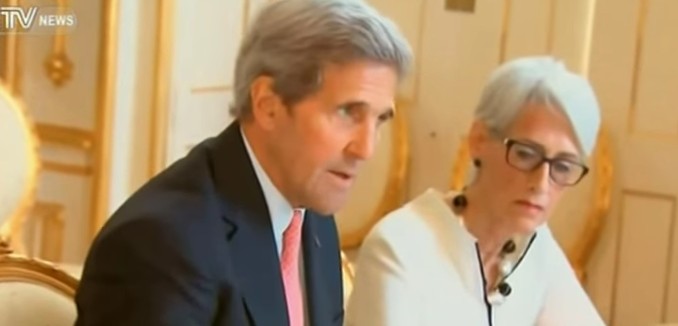The United States is prepared to grant Iran sanctions relief before it comes clean about its previous nuclear work, according to reports emerging from the nuclear negotiations in Vienna. The chief of the International Atomic Energy Agency stated that he believed that with Iran’s cooperation, he could resolve all issues of Iran’s past nuclear work in six month’s time, long after much of the sanctions relief would be rewarded, The Wall Street Journal reported (Google link) Saturday.
The head of the U.N.’s nuclear watchdog said on Saturday that he had agreed with Iran’s leadership to conclude an investigation into Tehran’s alleged suspected nuclear weapons work by the end of the year.
“With the cooperation from Iran, I think we can issue a report by the end of the year on the assessment of the clarification of the issues related to possible military dimensions,” Yukiya Amano, director general of the International Atomic Energy Agency, told reporters in Vienna shortly after returning from Iran. Tehran says its nuclear program has been conducted purely for civilian purposes.
The IAEA has been seeking Iranian responses to 12 sets of questions it first raised in 2011 about Iran’s past nuclear work, based on evidence suggesting Iran may have been developing nuclear weapons technology. The IAEA says that despite promising closer cooperation in November 2013, Iran has so far only partially addressed two of those questions. The agency says that to date, Tehran has balked at requests to interview key Iranian scientists and to visit alleged nuclear sites.
The Obama administration considers this arrangement to be sufficient to fulfill Iran’s commitment to account for its past nuclear research, The New York Times reported Saturday.
It is doubtful that the agency can fully resolve those issues by the end of the year. But American officials have been suggesting that if agency inspectors can get access to Iranian scientists, documents and some sites to resolve suspicions, the sanctions could begin to lift even before the agency reaches final conclusions.
“We have to see that they are getting the access they need,” one senior administration official said in May. “We don’t have to wait for the I.A.E.A. to issue its reports.”
This contradicts an assertion in April by U.S. Energy Secretary Earnest Moniz that “it would take Iran at least six months to meet the terms of a deal sufficient to warrant relief from the sanctions.”
Iran has failed to account completely for its past nuclear work, despite being required by the November 2013 Joint Plan of Action to resolve “past and present issues of concern.”
Knowing the full extent of Iran’s past nuclear research is essential to establishing a verifiable deal, as Omri Ceren, The Israel Project’s managing director for press and strategy, explained in The Tower last year.
At stake are international concerns over the so-called possible military dimensions (PMDs) of the Iranian nuclear program, the central significance of which has sometimes been underplayed by voices within the foreign policy community. While the P5+1 is charged with negotiating over Iran’s uranium work, its plutonium work, and its ballistic missile work – all of which the Iranians are obligated by half a dozen United Nations Security Council (UNSC) resolutions to roll back – the IAEA seeks to establish the scope of Iran’s overall atomic program, including in those three more specific areas.
The mandate stretches beyond full-blown weaponization work, and into military involvement in uranium mining, centrifuge construction, and so on. Full Iranian disclosure is considered a minimum to establishing a robust verification regime: The IAEA can’t verify that Iran has met its obligations to limit uranium work, for instance, unless it knows the full scope of the uranium work that’s being done. PMD-related transparency is seen as not just another issue – say, one that Iran could refuse to trade away by making concessions in other areas – but as a prerequisite to verifying Iranian compliance across all issues.
The Israel Project publishes The Tower.
An open letter last month written by nineteen experts, including five former members of the Obama administration, asserted that learning the full extent of Iran’s nuclear work “needs to be accomplished before any significant sanctions relief.”
Secretary of State John Kerry said last month that “we’re not fixated on Iran specifically accounting for what they did at one point in time or another,” signaling the administration’s retreat from insisting on resolving the PMD issue as a prerequisite for a comprehensive deal and further sanctions relief.
[Photo: CCTV News / YouTube ]




